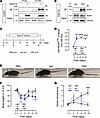Citation Information: J Clin Invest. 2025;135(15):e173308. https://doi.org/10.1172/JCI173308.
MuSK cysteine-rich domain antibodies are pathogenic in a mouse model of autoimmune myasthenia gravis
Abstract
The neuromuscular junction (NMJ), a synapse between the motor neuron terminal and a skeletal muscle fiber, is crucial throughout life in maintaining the reliable neurotransmission required for functional motricity. Disruption of this system leads to neuromuscular disorders, such as autoimmune myasthenia gravis (MG), the most common form of NMJ disease. MG is caused by autoantibodies directed mostly against the acetylcholine receptor (AChR) or the muscle-specific kinase MuSK. Several studies report immunoreactivity to the Frizzled-like cysteine-rich Wnt-binding domain of MuSK (CRD) in patients, although the pathogenicity of the antibodies involved remains unknown. We showed here that the immunoreactivity to MuSK CRD induced by the passive transfer of anti-MuSKCRD antibodies in mice led to typical MG symptoms, characterized by a loss of body weight and a locomotor deficit. The functional and morphological integrity of the NMJ was compromised with a progressive decay of neurotransmission and disruption of the structure of presynaptic and postsynaptic compartments. We found that anti-MuSKCRD antibodies completely abolished Agrin-mediated AChR clustering by decreasing the Lrp4-MuSK interaction. These results demonstrate the role of the MuSK CRD in MG pathogenesis and improve our understanding of the underlying pathophysiological mechanisms.
Authors
Marius Halliez, Steve Cottin, Axel You, Céline Buon, Antony Grondin, Léa S. Lippens, Mégane Lemaitre, Jérome Ezan, Charlotte Isch, Yann Rufin, Mireille Montcouquiol, Nathalie Sans, Bertrand Fontaine, Julien Messéant, Rozen Le Panse, Laure Strochlic
This file is in Adobe Acrobat (PDF) format. If you have not installed and configured the Adobe Acrobat Reader on your system.
Having trouble reading a PDF?
PDFs are designed to be printed out and read, but if you prefer to read them online, you may find it easier if you increase the view size to 125%.
Having trouble saving a PDF?
Many versions of the free Acrobat Reader do not allow Save. You must instead save the PDF from the JCI Online page you downloaded it from. PC users: Right-click on the Download link and choose the option that says something like "Save Link As...". Mac users should hold the mouse button down on the link to get these same options.
Having trouble printing a PDF?
- Try printing one page at a time or to a newer printer.
- Try saving the file to disk before printing rather than opening it "on the fly." This requires that you configure your browser to "Save" rather than "Launch Application" for the file type "application/pdf", and can usually be done in the "Helper Applications" options.
- Make sure you are using the latest version of Adobe's Acrobat Reader.
Unedited blot and gel images - Download (325.56 KB)



Copyright © 2025 American Society for Clinical Investigation
ISSN: 0021-9738 (print), 1558-8238 (online)

